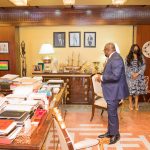The Supreme Court in its final verdict on the 2020 election petition indicated that witnesses of the petitioner failed to provide substantive testimonies which were relevant to the petitioner’s case except for Johnson Asiedu Nketia.
The court adjudged the Asiedu Nketia as star witness whose contribution was “emphatic” and “relevant” as compared to the second and third witnesses.
Reading the judgment on Thursday, Chief Justice Kwasi Anin-Yeboah said “Out of the three witnesses [the petitioner called], the one whose testimony appeared to have relevance to the issue as stake was Mr Johnson Asiedu Nketia (PW1). He was in fact the star witness of the petitioner. His testimony vividly explained the reason the petitioner is in court.
“As for the other two witnesses, that is, (PW2 and 3), Dr Kpessa Whyte and Mr Robert Mettle-Nunoo, the little said about their testimony related to the issue at stake, the better,” Justice Anin-Yeboah stated.
Moreover, the panel described the testimonies of Dr Michael Kpessa Whyte and Robert Mettle-Nunoo as a “fanciful tale”.
“While the testimony of PW1 [Johnson Asiedu Nketia] was emphatic, that the petitioner is not in court to challenge or compare the figures or data presented by the 1st Respondent with any other figures.
“The testimonies of PW2 [Dr Kpessa Whyte] and 3 [Rojo Nunoo] were in respect of alleged irregularities in the figures or data on some of the collation forms that they sighted in the strong room but after which they ultimately signed or certified.
“Notwithstanding all these allegations of misunderstandings with staff of the 1st Respondent in the strong room and the fact that they were absent during the declaration they did not give any indication as to how these happenings and their absence affected the final results announced by the 1st Respondent,” Justice Anin-Yeboah read.
He continued, “Having signed or certified these forms, the witnesses, particularly, PW3, cannot turn round to talk of irregularities in the said forms. Their testimonies would have carried weight if the purpose of the petition was to challenge entries made by on the collation form or summary sheets but that is not the case.
“Their testimonies were, therefore, of no relevance to the issues set down for determination and we find them unworthy whatsoever in the settlement of the issues.”



